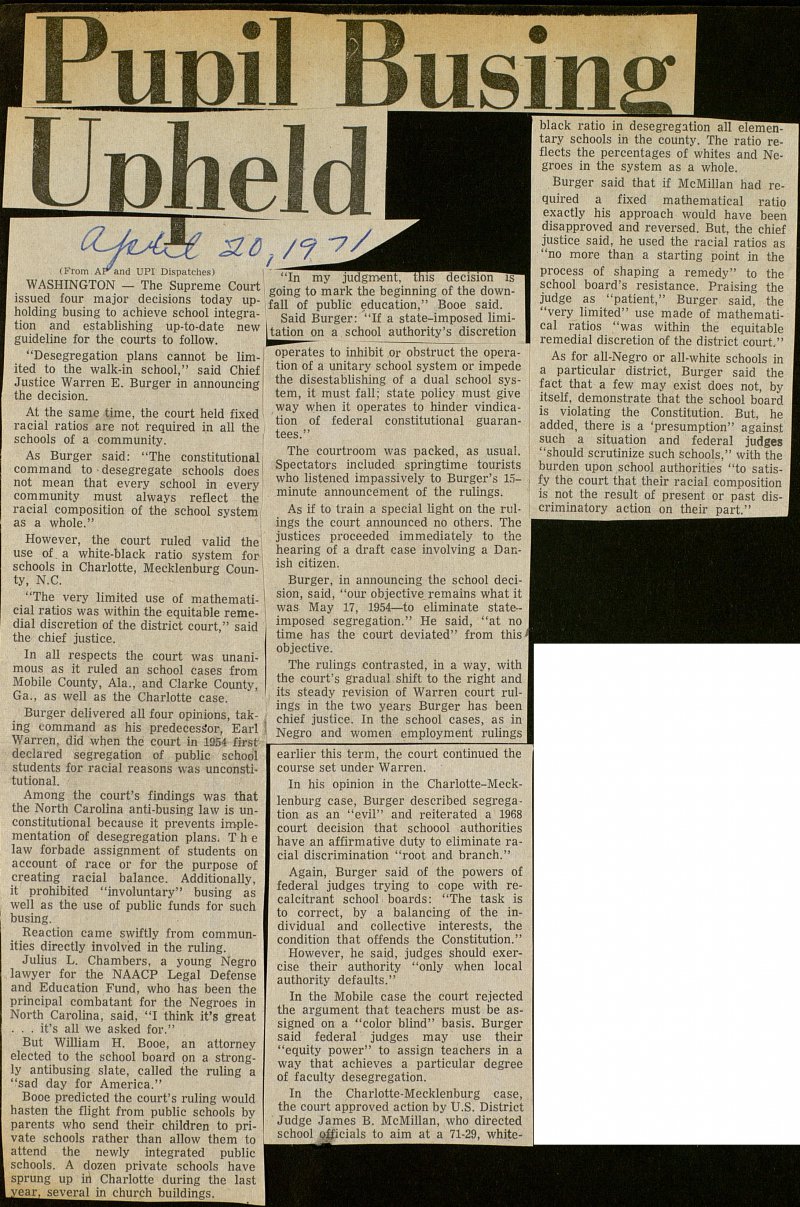Pupil Busing Upheld

WASHINGTON - The Supreme Court issued four major decisions today upholding busing to achieve school integration and establishing up-to-date new guideline for the courts to follow. "Desegregation plans cannot be limited to the walk-in school," said Chief Justice Warren E. Burger in announcing the decisión. At the same time, the court held fixed racial ratios are not required in all the schools of a community. As Burger said: "The constitutional command to ■ desegregate schools does I not mean that every school in every' community must always reflect the racial composition of the school system as a whole." However, the court ruled valid the use of. a white-black ratio system for schools in Charlotte, Mecklenburg County, N.C. "The very limited use of mathematicial ratios was within the equitable remedial discretion of the district court," said the chief justice. In all respects the court was unanimous as it ruled an school cases from Mobile County, Ala., and Clarke County, Ga., as well as the Charlotte case. Burger delivered all four opinions, taking command as his predecesáor, Earl Warren, did when the court in 1954 first dcclared segregation of public school students for racial reasons was unconstitutional. Among the court's findings was that the North Carolina anti-busing law is unconstitutional because it prevents irnplementation of desegregation plans The law forbade assignment of students on account of race or for the purpose of creating racial balance. Additionally, it prohibited "involuntary" busing as well as the use of public funds for such busing. Reaction came swiftly from communities directly involvèd in the ruling. Julius L. Chambers, a young Negro lawyer for the NAACP Legal Defense and Education Fund, who has been the principal combatant for the Negroes in North Carolina, said, "I think it's great . . . it's all we asked for." But William H. Booe, an attorney elected to the school board on a strongly antibusing slate, called the ruling a "sad day for America." Booe predicted the court's ruling would hasten the flight from public schools by parents who send their children to private schools rather than allow them to attend the newly integrated public schools. A dozen private schools have sprung up iri Charlotte during the last ear, several in church buildings. In my judgment, this decisión is I going to mark the beginning of the downI fall of public education," Booe said. Said Burger: "If a state-imposed limiI tation on a school authority's discretion I operates to inhibit or obstruct the operation of a unitary school system or impede the disestablishing of a dual school system, it must fall; state policy must give [ way when it operates to hinder vindication of federal constitutional guarantees." The courtroom was packed, as usual. Spectators ineluded springtime tourists who listened impassively to Burger's 15minute announcement of the rulings. As if to train a special light on the rulings the court announced no others. The justices proceeded immediately to the hearing of a draft case involving a Danish citizen. Burger, in announcing the school decisión, said, "our objective remains what it was May 17, 1954 - to elimínate I imposed segregation." He said, "at no I time has the court deviated" from this 4 objective. The rulings contrasted, in a way, with the court's gradual shift to the right and its steady revisión of Warren court rulings in the two years Burger has been j chief justice. In the school cases, as in ! Negro and women employment rulings earlier this term, the court continued the course set under Warren. In his opinión in the Charlotte-Mecklenburg case, Burger described segregation as an "evil" and reiterated a 1968 court decisión that schoool authorities have an affírmative duty to elimínate racial discrimination "root and branch." Again, Burger said of the powers of federal judges trying to cope with recalcitrant school boards: "The task is to correct, by a balancing of the individual and collective interests, the condition that offends the Constitution." However, he said, judges should exercise their authority "only when local authority defaults." In the Mobile case the court rejected the argument that teachers must be assigned on a "color blind" basis. Burger said federal judges may use their "equity power" to assign teachers in a way that achieves a particular degree of faculty desegregation. In the Charlotte-Mecklenburg case, the court approved action by U.S. District Judge James B. McMillan, who directed school ojïicials to aim at a 71-29, black ratio in desegregation all elementary schools in the county. The ratio reflects the percentages of whites and Negroes in the system as a whole. Burger said that if McMillan had required a fixed mathematical ratio exactly his approach would have been disapproved and reversed. But, the chief justice said, he used the racial ratios as "no more than a starting point in the process of shaping a remedy" to the school board's resistance. Praising the judge as "patiënt," Burger said, the "very limited" use made of mathematical ratios "was within the equitable remedial discretion of the district court." As for all-Negro or all-white schools in a particular district, Burger said the fact that a few may exist does not, by itself, demónstrate that the school board is violating the Constitution. But, he added, there is a 'presumption" against such a situation and federal judges "should scrutinize such schools," with the burden upon school authorities "to satisfy the court that their racial composition I is not the result of present or past I criminatory action on their part." J